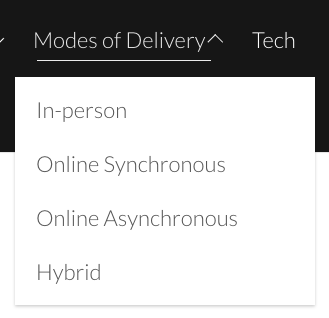5 Benefits of Fully Online Learning for Students and Employers
Canada’s 2021 National Survey of Online and Digital Learning found that nation-wide there is a “growing preference for online learning options and an increased expectation for digital resources” (Johnson, 2021, p.9). At Conestoga, the gradual movement to 30% of a program delivered fully online provides many benefits to students and their future employers. Here are some of them.
1. Future Work Skills
A mix of in-person, hybrid, and fully online courses prepares students to work effectively on industry projects across geographical distances and with teams spread out across a company(s). While in-person courses help students to develop their interpersonal skills, online courses help students to develop their written communication skills. Hybrid courses help students to stay aware of what mode of communication would be the best choice for a particular need. The Conference Board of Canada reminds us that:
“Canadians need to have the right skills. Employers cite digital literacy and social-emotional skills like resilience, self-management, and communication as the most common and critical skill sets for the future. The pandemic accelerated the transition to digital spaces, requiring many more workers to improve their understanding of what technologies are available, as well as how, when and why to use them.”
The Future of Work is Now
2. Dynamic, Interactive Learning
Digital learning resources refer to digital documents and tools that engage students in learning and support learning goals. These resources can communicate academic content, help students to plan and organize their work, and communicate with others. They can provide learning supports that are visual, auditory, translation, and collaborative. Such tools are available to support, enhance, and deepen learning in fully online learning (US Dept of Education, 2018).
Not only can digital learning resources can provide interactive, engaging, and supported learning for fully online students; faculty can create, curate, share, and reuse digital learning resources in a number of different fully online learning contexts. One meta-analysis study found that on the topics of learning outcomes, student satisfaction, and effectiveness of problem-based learning, “online learning is at least as effective of the traditional face-to-face learning” (Castro & Tumibay, 2021, para. 24).
3. Diverse Students Have Greater Access
In online learning, students can review learning content on their own time and and speed. Introverted students, students with with family commitments, and those who need time to process before engaging learn can learn effectively online where they have time to respond to prompts.
Online learning can also be a more democratic learning space that shifts the power dynamics in the traditional classroom to one in which women and minorities may feel able to present themselves as they wish as well as safe and empowered to speak. Based on a recent Ipsos report, one CNBC article (Hess, 2021) notes that more black and hispanic students feel positive about online learning, in part because online learning helps them to avoid racism and micro-aggressions in class.
In addition, fully online options make learning accessible to students who otherwise face barriers to accessing campus. One CBC news article reports that for some students, particularly those who are immunocompromised, online learning may be their only option while the pandemic is still prevalent (Taekema, 2022).
4. Self-Care and Environmental Care
Students who do not have to commute daily to campus are better able to manage their time and finances. One CBC news report (Piper, 2022) explains how students disabilities, anxiety disorders and socioeconomic gain access to educational programming that meets their personal and learning needs. When students better manage their time and finances, they may be less stressed and more prepared for fully online learning.
As well, online learning is lowering environmental costs. According to 6 Environmental Benefits of Online Learning, online learning reduces transportation pollution, energy consumption, paper waste, water usage, and plastic and food waste on college campuses.
5. Faculty Support is Available
Conestoga has invested heavily in it Teaching and Learning Centre and workshops, courses and 24/7 supports are available to help faculty teach effectively in all modes. In fact, part-time faculty are paid $40/hour to attend workshops. See Conestoga’s Faculty Learning Hub Modes of Delivery menu.
References
Johnson, N. (2021). 2021 Special topics report: The growth of online learning and digital learning resources in Canadian post-secondary education. Canadian Digital Learning Research Association.
Castro, & Tumibay, G. M. (2021). A literature review: efficacy of online learning courses for higher education institution using meta-analysis. Education and Information Technologies, 26(2), 1367–1385. https://doi.org/10.1007/s10639-019-10027-z
Hess, A. (2021, July 29). As college students head back to class, some say benefits of online learning should not be forgotten. CNBC.
Piper, D. (2022, March 5). Flexibility of virtual learning prompts some post-secondary students to pursue more online studies. CBC.
U.S. Department of Education, Office of Planning, Evaluation and Policy Development, Policy and Program Studies Service. (2018). National Study of English Learners and Digital Learning Resources.
Taekema, D. (2022, September 22). “Immunocompromised students scrambling for online options with return to in-person classes.” CBC.



